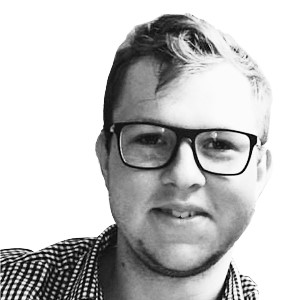Alex Zwetsloot
I studied Biochemistry and Molecular Medicine at the University of Nottingham between 2013-2016 and am now in the first year of the MRC DTP scheme. In my third year project at Nottingham I studied the role of a tiny protein called survivin, which has roles as part of the chromosomal passenger complex as well as inhibiting cell death. We (myself, Drs Claire Friel and Sally Wheatley) were particularly interested in survivin’s microtubule stabilising properties which had been observed in cells, and we spent a long time reconstructing the system in a test-tube and inspecting it using TIRF microscopy only to find that it probably doesn’t have this effect on its own. This experience whet my appetite for research science, biophysics, and high-resolution microscopy, thus I applied for what was, at the time, the MRC DTP in “Quantitative Imaging”.
Fast forward a year and I am now nearly at the end of the lecture portion of the IBR MSc year, and looking forward to getting back into the lab. The MSc year has been a world apart from my experiences at BSc level, where I preferred to be relatively anonymous amongst my cohort of 150. Considering there’s only 10 MSc students, there’s nowhere to hide here! I have had the opportunity to do things I wouldn’t have wanted to at BSc level. For example, I have had the chance to get involved with student democracy (student-staff liaison committee (SSLC), MSc teaching meetings) as well as representing all medical school postgraduate taught students on the Graduate Studies Committee of the Faculty of Medicine and Institutional Teaching and Learning Review.
So far I’ve enjoyed the interdisciplinary aspect of the MSc year. I’ve learned about things ranging from statistics to electrochemical imaging, and I feel a lot of what I’m learning will be of immediate use for me in my PhD. The modules we study can be genuinely challenging at times, which is a great thing, and we have the support of one another to complete coursework and prepare for exams. I’ve loved forming close friendships with the small cohort which will be a great support network throughout the next 3.5 years, and am looking forward to getting back to research science. My first mini-project will be with Anne Straube, who shares my passion for microtubules and everything that sticks to or traverses them. My second will be with Nick Carter, who is building an open-source microscope for TIRF, and I plan to be programming the front-end control software while sapping up as much knowledge as possible about the complicated electronics involved.
Questions, comments? Find me on twitter: @zwetza
MRC DTP in Interdisciplinary Biomedical Research
Overview of Alex's MSc Interdisciplinary Biomedical Research Year
| Term 1 |
|
| Taught modules |
CH920 Cellular Systems and Biomolecules I BS930 Cellular Systems and Biomolecules II CH922 Microscopy and Imaging CH923 Statistics for Data Analysis LF903 Quantitative Skills for System Biology |
| Term 2 | |
| Taught modules |
CH926 Molecular Modelling MD978 Research Topics in Interdisciplinary Biomedical Research MD991 Physical Biology of the Cell |
| Across the academic year | |
| Portfolio | CH948 Warwick Interdisciplinary Biomedical Research |
| Term 3 | |
| Research project 1 | Develop acquisition protocols and firmware for STORM image tiling (supervisor: Dr Nick Carter, WMS) |
| Summer vacation |
|
| Research project 2 | Bidirectional transport along microtubules: cooperation of Kif1C and dynein (supervisor: Dr Anne Straube, WMS) |

